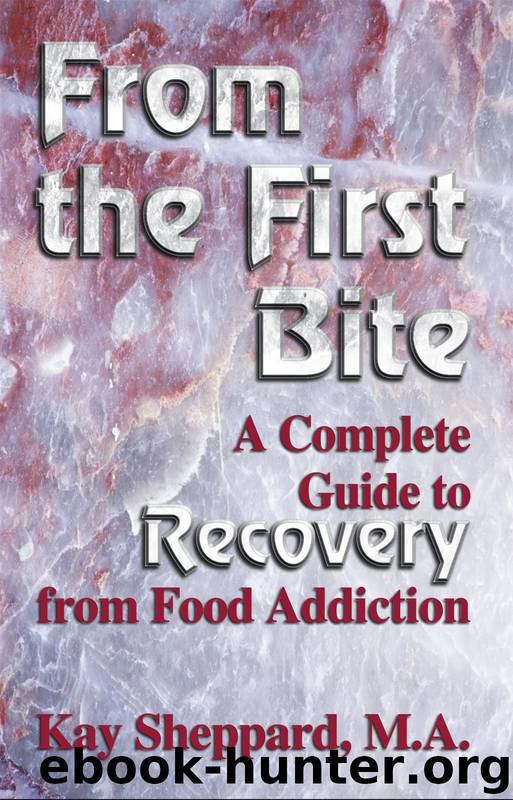From the First Bite by Kay Sheppard

Author:Kay Sheppard
Language: eng
Format: epub
Publisher: Health Communications Inc
Published: 2019-03-16T16:00:00+00:00
Step Ten: Keeping Our House Clean
Continued to take personal inventory and when we were wrong promptly admitted it.
The Tenth Step does not say if we were wrong. It says when we were wrong, leaving little doubt that we will continue to mess up. This is a program that recognizes progress, not perfection. According to AA literature, there are three types of Step Ten inventory: a spot-check when disturbed, the day’s end inventory and an annual review to be shared with our sponsor. Using all three, we discover that the Tenth Step is a powerful tool used to avoid relapse. This inventory gives us the information we need to avoid reverting to those self-destructive patterns that will lead us back into the disease. By taking a daily check, we can determine whether we are moving toward recovery by practicing the steps or moving toward relapse by discarding them. Step Ten is undoubtedly the greatest relapse prevention tool. It is a growth step that, along with Steps Eleven and Twelve, is practiced on a daily basis.
A quick Tenth Step review just before bed might go something like this: What did I do today to weaken my recovery? What did I do today to strengthen my recovery? A more extensive evening inventory might include a checklist. (See Appendix V.) When using this kind of checklist, we include our basic recovery tasks to ensure that we perform them on a scheduled basis. We watch for weaknesses in our recovery program to guard against undermining those actions that support strong recovery. We definitely include on our checklist our persistent defects and behaviors such as gossip, pride, anger, jealousy or fear. It may also be helpful to include honesty in weighing and measuring, planning, and reporting our food. Step Ten is the continued practice of Steps Four through Nine. We watch for our character flaws to resurface and continue to identify them and their consequences. We promptly admit these to another recovering person, usually our sponsor. When times are difficult we increase meetings, pray for help and use our recovery techniques.
Take some time to think about and write your answers to the following questions:
• When problems occur, do I promptly acknowledge that something is wrong and take action to correct it?
• Have I learned to resolve problems without eating over them?
• Do I use my inventory to review my recovery program for strengths and weaknesses?
• What tools do I use to resolve toxic thoughts and feelings?
• Have I made use of “on the spot,” “daily” and “annual” inventories?
Download
This site does not store any files on its server. We only index and link to content provided by other sites. Please contact the content providers to delete copyright contents if any and email us, we'll remove relevant links or contents immediately.
| Adult Children of Alcoholics | Alcoholism |
| Drug Dependency | Gambling |
| Hoarding | Obsessive Compulsive Disorder (OCD) |
| Sexual | Smoking |
| Substance Abuse | Twelve-Step Programs |
The Hacking of the American Mind by Robert H. Lustig(4381)
Right Here, Right Now by Georgia Beers(4209)
Fingerprints of the Gods by Graham Hancock(4004)
Goodbye Paradise(3809)
Bad Pharma by Ben Goldacre(3427)
Happiness by Matthieu Ricard(3046)
The Social Psychology of Inequality by Unknown(3029)
More Language of Letting Go: 366 New Daily Meditations by Melody Beattie(3027)
The Plant Paradox by Dr. Steven R. Gundry M.D(2620)
Drugs Unlimited by Mike Power(2594)
Confessions of a Shopaholic by Sophie Kinsella(2370)
Borders by unknow(2313)
Make Love Not Porn by Cindy Gallop(2105)
Dry by Augusten Burroughs(2101)
Stop Being Mean to Yourself: A Story About Finding the True Meaning of Self-Love by Melody Beattie(2004)
Getting Off by Erica Garza(1931)
Belonging by Unknown(1855)
Yoga and the Twelve-Step Path by Kyczy Hawk(1833)
Unmasking Male Depression by Archibald D. Hart(1808)
